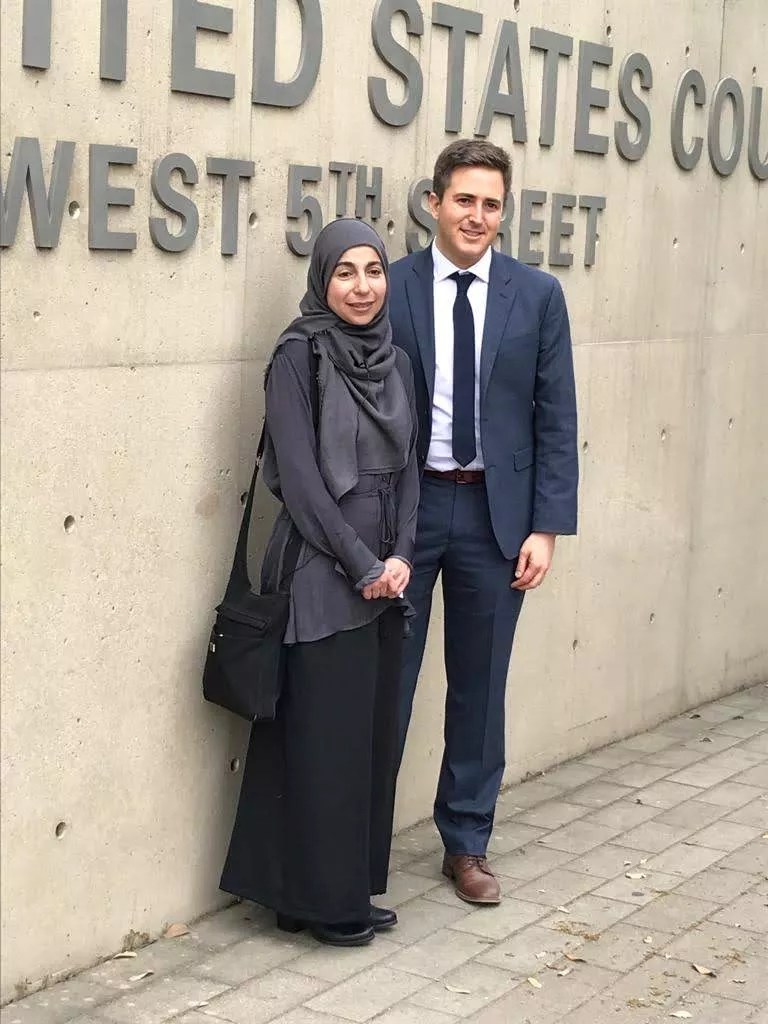
Justin McIntosh Wikimedia Commons

Audio By Carbonatix
George Hale is a journalist, an occupation that confers on him no special legal status beyond what any American citizen enjoys and may even, on any given day, rate him a little lower. Being a reporter has taught him that somebody at some point will always want to shut him up, a lesson that adds some piquancy to his experience as a plaintiff in a lawsuit against a Texas law, recently knocked down by a federal judge, that sought to silence certain critics of Israel.
“It’s about the right of all people here in Texas to believe what they want without fear of punishment by the government,” Hale, who lives in Dallas, told me earlier this week.
Punishment by the government is a concept never too far from home for Hale, who is host of Buried, a public radio podcast that Hale co-creates with Jerrod Knight at 88.9 KETR-FM at Texas A&M University-Commerce. Buried, now on the air for more than a year, is the meticulous excavation, no pun intended, of a strange cold case in East Texas.
Already winner of two first-place Associated Press awards, the podcast asks how Carey Mae Parker, a young mother who lived in a semi-rural community near Lake Tawakoni, 45 miles east of Dallas, could have disappeared off the face of the earth in 1991 and yet the police say no one told them she was missing for 22 years. And still no one knows what happened to her – only that it doesn’t sound good.
Needless to say, officials and pillars of the community in Hunt County are not pleased with the unearthing of this bizarre case. It does give off a distinct odor of “only in East Texas.” After all, people disappear everywhere, all the time, but in most places when it happens somebody mentions it to the cops. Hale, whose relentless shoe-leather reporting has lifted the case up from obscurity and put it back on the front burner, is not winning popularity polls in Greenville, the county seat.
A day when his social status may have felt a little lower than average came upon him on Aug. 2, 2017, when he was driving from Dallas to Commerce in East Texas. Hale got a call in the car from Sgt. Jeff Haines of the Hunt County Sheriff’s Department. The call followed by a few days a sometimes contentious face-to-face conversation between Hale, Haines and other law enforcement personnel at the sheriff’s offices in Greenville.
The sheriff’s department had learned that Hale was in possession of the department’s entire investigative file on the case, notable mainly for the fact that it contained fewer pages than a decent dog-bite case. Hale insisted then and insists now that he came into possession of the file by fully legal means. The sheriff’s department insisted that revealing any part of the file might compromise the department’s case, even though for the better part of three decades there had been no case at all until Hale disinterred it.
Hale recorded the call in his car that day, because he’s a reporter. He told Haines he couldn’t reveal his source. He said, “I really don’t mean any disrespect by that.”
Haines told him, “It’s not a matter of respect. It’s a matter of criminal offense. So I will let the sheriff know that you were in possession of evidence on an open case and refusing to give us information (inaudible) compromise the integrity of the investigation and probably blow the case. Those are the ramifications of the action that you’ve taken.”
Hale put the entire episode, including recordings of the meeting at Hunt County and the call in the car, into the podcast. Since then he and Haines have gotten around their difficulties, Hale tells me, and they are on OK terms now.
People get hot under the collar. And I don’t mean to portray this as Hale being beaten with a rubber hose, although most people would be taken aback to have a police officer accuse them of a criminal offense when they hadn’t broken the law. I only mean to make the point here that Hale, as a good reporter, is not unaccustomed to people threatening him in an effort to make him shut up.
That was the spirit in which he took orders from Texas A&M-Commerce, sponsor of his podcast, that he sign a contract requiring him to vow he would never take part in or speak in favor of any boycott of Israel. Texas A&M was required by a new state law to put that clause into the contracts of all of its contractors.
That law was struck down recently by U.S. District Judge Robert Pitman in Austin. Quoting from an earlier decision, Pitman wrote that the anti-Israel boycotts “are not only inherently expressive, but as a form of expression on a public issue, rest on ‘the highest rung of the hierarchy of First Amendment values.'”
Pitman noted that lawyers for the state, defending the anti-boycott law, had shown him a vote tally by which only five legislators had voted against the law: “Texas touts these numbers as the statute’s strength,” the judge wrote. “They are, rather, its weakness.”
Pitman then quoted from another opinion: “If there is any fixed star in our constitutional constellation, it is that no official, high or petty, can prescribe what shall be orthodox in politics, nationalism, religion, or other matters of opinion or force citizens to confess by word or act their faith therein.”
In his opinion, the judge took note of arguments Hale had made in an affidavit. Hale said he didn’t want to violate the agreement he had signed, but he wasn’t sure how to stay right with it.

George Hale with co-plaintiff Bahia Amawi, a school speech pathologist in Pflugerville, outside the federal courts in Austin where a judge had just ruled in their favor.
George Hale
I have told you about Hale before. He has lived and worked as a reporter in embattled parts of the Middle East. As a consequence of his experiences there and after he was no longer a reporter in the Middle East, he had taken part as a private citizen in some of the anti-Israel boycotts before unhappily signing the required loyalty oath at A&M-Commerce. After signing, he honored the oath by not taking part or speaking in favor of the boycotts.
One of the companies included in some of the anti-Israel boycotts is Hewlett-Packard, because of its work on border security in Israel. Hale told the court he doesn’t own any HP equipment or software, because he didn’t buy any when he was boycotting. But he wondered if he would be required under the Texas law to buy HP products in order to show that he was no longer boycotting.
“The state of Texas has no right to tell me or anyone what to believe about the Israeli-Palestinian conflict or any other issue of public debate, period.” — George Hale
Pitman wrote in his opinion: “… it is unclear to the Court how a contractor can ensure its actions comply with (the Texas law’s) no-boycott certification requirement after entering into a contract with the State. Must Hale’s default action be to purchase HP products to ensure that he is not found liable for breaching his no-boycott certification? The statute offers no guidance …”
One of the plaintiffs’ arguments homes back in toward Hale’s own experience as a reporter: a law so vague and so dependent on evidence as arcane as the brand of a recently purchased computer monitor is never going to be broadly or evenly enforced. Nobody’s going to go out and spot check everybody’s computer equipment. That law will only be enforced when somebody in authority targets a particular individual.
“They’re not going to check everyone’s contract for every single person,” Hale told me. “Who are they going to enforce it against? They’re going to enforce it against people who speak out about this issue, just by default. It’s common sense.”
He wonders how long it will take the conservative backers of the anti-boycott law to regret starting this snowball down the hill: “Wait until the Legislature tries to make you sign a contract saying you won’t boycott the NRA or Planned Parenthood or whatever else.”
In the meantime, the Legislature has amended the original law to say it applies only to big contractors, not to small sole proprietors like Hale. Hale says, and the ACLU agrees, that this tweak is barely enough to smear political rouge over the law’s more bullying appearances and does nothing to address underlying constitutional problems.
But at least Buried is still on the air, soon to come up with some wonderful new revelations, Hale promises. And I’m glad for that, because it’s such great work. You know what they say. Only in East Texas.
I have my own personal pause about the boycotts. Let’s say they succeed. The boycotts are called BDS, for boycott, divestment and sanctions. The BDS movement seeks an Israeli withdrawal from the occupied territories, removal of the West Bank wall, full equality for Arab-Palestinian citizens of Israel and full right of return for all Palestinian refugees to homes and property in Israel. Imagine it all happens. Then we will have written a warrant for the extinction of Israel as a Jewish homeland and state.
On the other hand, if we sign a warrant for the extinction of our constitutionally protected right of free speech in our own country, this won’t really be our own country anymore. It will be some other country.
Hale believes holding on to our own country depends absolutely on protecting our right to speak freely and to believe what we damn well want to believe: “It’s kind of a fundamental thing,” he said.
“I mean, look, I guess you could also say, ‘Back up,’ you know, look, ‘Believe what you want about BDS,’ right? It’s a subject of debate. There are reasonable people on all sides.
“But the state of Texas has no right to tell me or anyone what to believe about the Israeli-Palestinian conflict or any other issue of public debate, period.”
That is what the judge said. There will be an appeal.